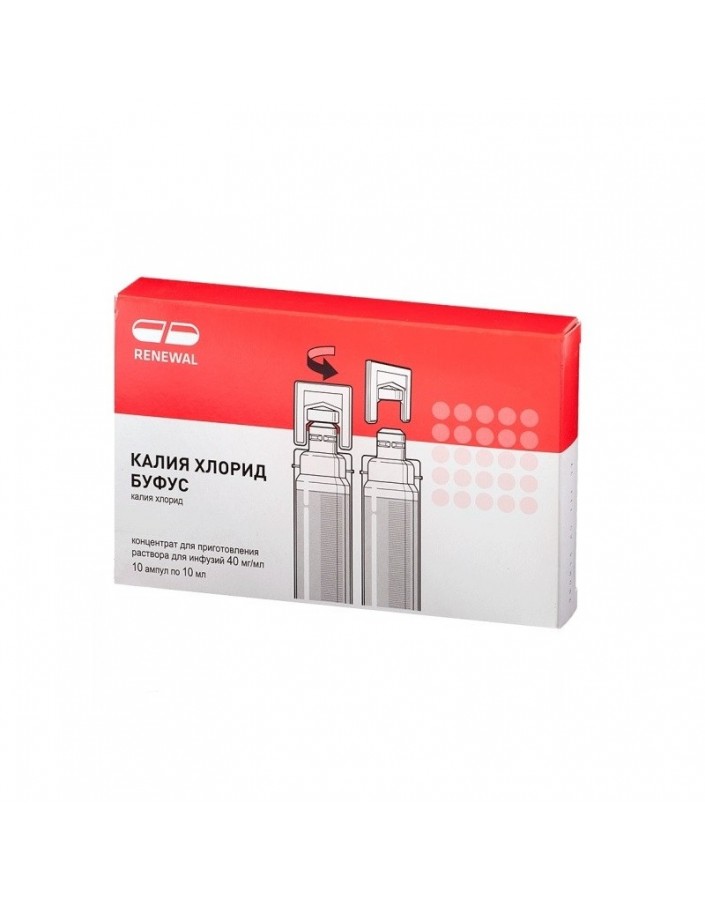




Security policy (edit with Customer reassurance module)

Delivery policy (edit with Customer reassurance module)

Return policy (edit with Customer reassurance module)
A means to compensate for the lack of potassium in the body. Contribute to maintaining the necessary intra-and extracellular levels of potassium. Potassium - the main intracellular ion, plays an important role in the regulation of various body functions. Participates in the maintenance of intracellular osmotic pressure, in the processes of conduction and transmission to the innervated nerve impulses, in the reduction of skeletal muscles and in a number of biochemical processes. Reduces the excitability and conductivity of the myocardium, in high doses - inhibits automatism.
Hypokalemia of various genesis, including due to vomiting, diarrhea, hyperaldosteronism, polyuria in chronic renal failure, taking certain medications; arrhythmias, incl. with glycosidic intoxication; hypokalemic form of paroxysmal myoplegia.
The daily dose for oral administration corresponds to 50-100 mEq of potassium, a single dose - 25-50 mEq of potassium; frequency of administration and duration of use depend on the evidence.
For iv administration, the dose and treatment regimen are set individually.
Hyperkalemia is possible - paresthesia in the upper and lower extremities, muscle weakness, arrhythmias, heart block, cardiac arrest, confusion.
Mostly after ingestion, nausea, vomiting, diarrhea are possible. There are reports of ulcerative lesions of the stomach and small intestine, sometimes with bleeding, perforation, the subsequent formation of strictures.
After i / v administration, hyperkalemia may manifest itself predominantly by the development of impaired cardiac activity.
Impaired renal excretory function, complete heart block, hyperkalemia of various etiologies.
Be careful when using AV conduction disturbances; inside - in diseases of the gastrointestinal tract. In the course of treatment, it is necessary to control the level of potassium in the blood and the ECG, and in the treatment of potassium deficient conditions, KSHR should be carefully monitored.
The simultaneous use of potassium chloride with potassium-sparing diuretics is not recommended.
In patients with chronic kidney disease or in any disease involving a violation of potassium excretion from the body, or with too fast IV injection of potassium chloride, hyperkalemia may develop, which can potentially be fatal. Early clinical manifestations of hyperkalemia (sharpening of the P wave, disappearance of the U wave, reduction of the S-T segment, and prolongation of the QT interval) usually appear when serum potassium concentrations range from 7 to 8 meq / l. Heavier symptoms (including muscle paralysis and cardiac arrest) develop at a potassium concentration of 9-10 meq / l.It should be borne in mind that hyperkalemia, leading to death, can develop quickly and be asymptomatic. In case of an overdose of potassium chloride, a solution of sodium chloride is injected inside or in / in; or in / in 300-500 ml of dextrose solution containing 10-20 U of insulin per 1000 ml. If necessary, conduct hemodialysis and peritoneal dialysis. Safety and efficacy of potassium chloride in children have not been established.
If necessary, use during pregnancy should weigh the expected benefits to the mother and the potential risk to the fetus; during lactation should decide on the termination of breastfeeding.
With simultaneous use of potassium chloride with potassium-sparing diuretics and ACE inhibitors increases the risk of developing hyperkalemia (plasma potassium levels should be monitored). Under the influence of potassium preparations, the side effects of cardiac glycosides are reduced, the effect of quinidine on the heart is enhanced, as well as the undesirable effect of disopyramide on the cardiovascular system.